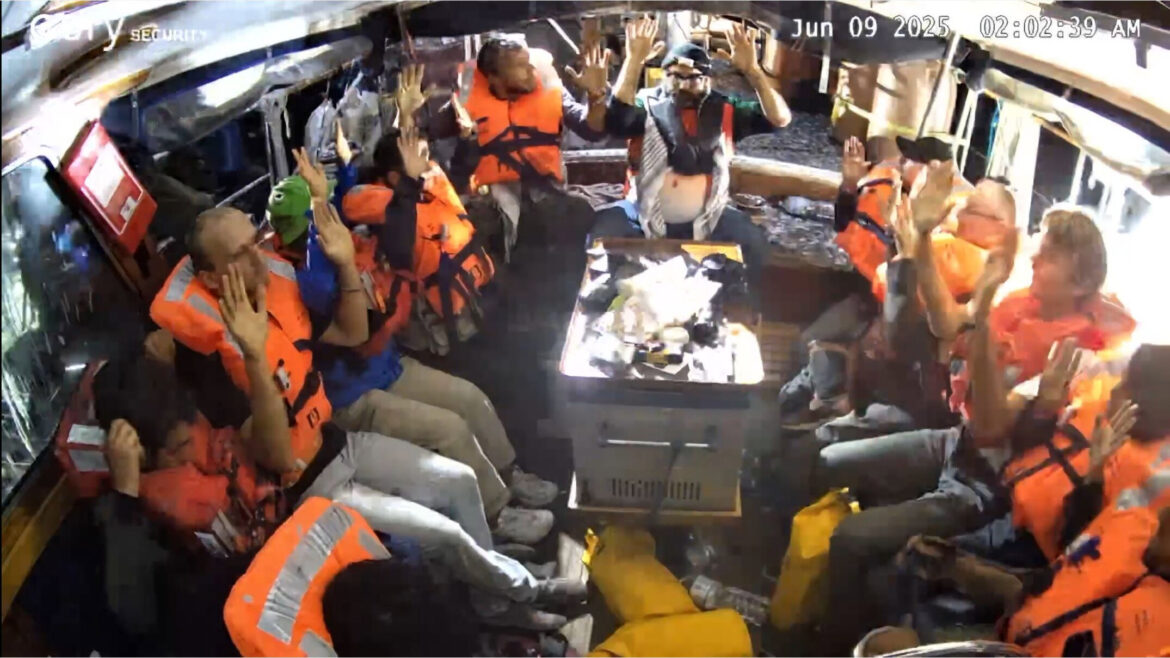Protests have broken out across the globe after Israeli forces detained climate activist Greta Thunberg during the interception of a Gaza-bound aid flotilla, sparking widespread condemnation and urgent calls for her release. The dramatic incident has triggered a wave of rallies in major cities and placed fresh international scrutiny on Israel’s actions in the region.
The flotilla, organized by international activists and humanitarian groups, set sail with food, medicine, and other supplies intended for civilians in Gaza. The Israeli navy intercepted the vessels in the eastern Mediterranean on Tuesday, citing security concerns and accusing organizers of attempting to breach its blockade. Thunberg, who had joined the effort as part of her broader humanitarian advocacy, was reportedly taken into custody along with several other activists.
The news spread rapidly, igniting immediate reactions from governments, rights organizations, and the public. In London, thousands of demonstrators gathered outside the Israeli Embassy, chanting for Thunberg’s release and calling on the British government to increase diplomatic pressure. Police officers maintained a heavy presence as crowds waved Palestinian flags and carried banners reading “Free Gaza” and “Free Greta.”
In Berlin, Paris, Stockholm, and New York, protests swelled through the night. Social media amplified the message, with hashtags calling for Thunberg’s freedom trending globally within hours of the detention. Human rights organizations accused Israel of silencing dissent and undermining peaceful efforts to deliver humanitarian assistance.
The UK government expressed alarm at the detention. A spokesperson for Prime Minister Rishi Sunak said officials were “very concerned” and had reached out to Israeli authorities for urgent clarification on Thunberg’s status. The spokesperson emphasized the need to ensure the safe treatment of all detainees and reiterated the UK’s support for humanitarian access to Gaza.
The United Nations also weighed in, with a statement from its humanitarian affairs office stressing that aid shipments should not be obstructed and that international law protects the right to deliver essential supplies to civilian populations. Diplomats at the UN signaled that the incident could fuel renewed debates over the legality of Israel’s blockade of Gaza, which has faced criticism for more than a decade.
Israel defended its actions, arguing that the flotilla posed a security risk and accusing its organizers of attempting to aid groups it considers hostile. Officials said the vessels were diverted to the port of Ashdod and that all supplies would be inspected before any potential transfer to Gaza. However, critics argued that this stance has long been used as a pretext to stifle humanitarian initiatives.
Supporters of Thunberg stressed that her involvement was part of a growing movement linking climate activism with human rights and global justice. Her detention, they said, underscored the risks faced by young activists challenging state policies on the world stage.
In Sweden, where Thunberg first rose to prominence, rallies drew thousands in solidarity. The Swedish foreign ministry confirmed it was in direct contact with Israeli authorities and was pressing for immediate consular access. Thunberg’s family released a statement saying they were “deeply worried” and called on the international community to keep pressure on Israel to secure her release.
The detention has also raised new political tensions in the United States, where lawmakers are sharply divided over policy on Israel and Gaza. Several progressive members of Congress demanded that the Biden administration take stronger action to ensure Thunberg’s release, while Republicans accused activists of undermining Israel’s security.
Analysts say the protests could mark a significant turning point in global opinion, particularly among younger generations who view Thunberg as a symbol of peaceful resistance. The intersection of climate justice, humanitarian relief, and Middle East politics has created a potent rallying point that could galvanize further international action.
Meanwhile, in Gaza, residents expressed frustration at the continued restrictions on aid. Local officials said the supplies on the flotilla represented only a fraction of what was needed to address urgent shortages in medicine, fuel, and clean water. They accused Israel of deliberately prolonging the crisis by blocking international relief efforts.
Protests are expected to continue in the coming days, with organizers in several countries announcing plans for coordinated global demonstrations over the weekend. Solidarity marches are already scheduled in Washington, Brussels, and Sydney, highlighting the scale of international outrage.
For many observers, the detention of Thunberg has become more than just a dispute over one activist. It has crystallized wider frustrations about the humanitarian situation in Gaza, the role of international law, and the moral responsibilities of nations in addressing conflict and crisis.
As night fell on Wednesday, the question of what happens next remained unanswered. With global protests escalating and governments weighing diplomatic responses, Israel faces mounting pressure to release Thunberg and the other activists. The standoff has underscored the fragile balance between security concerns and humanitarian obligations, a balance that is once again being tested on the world stage.



